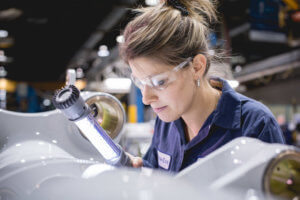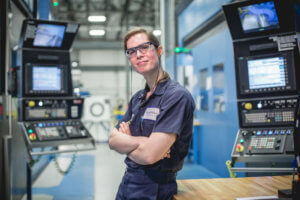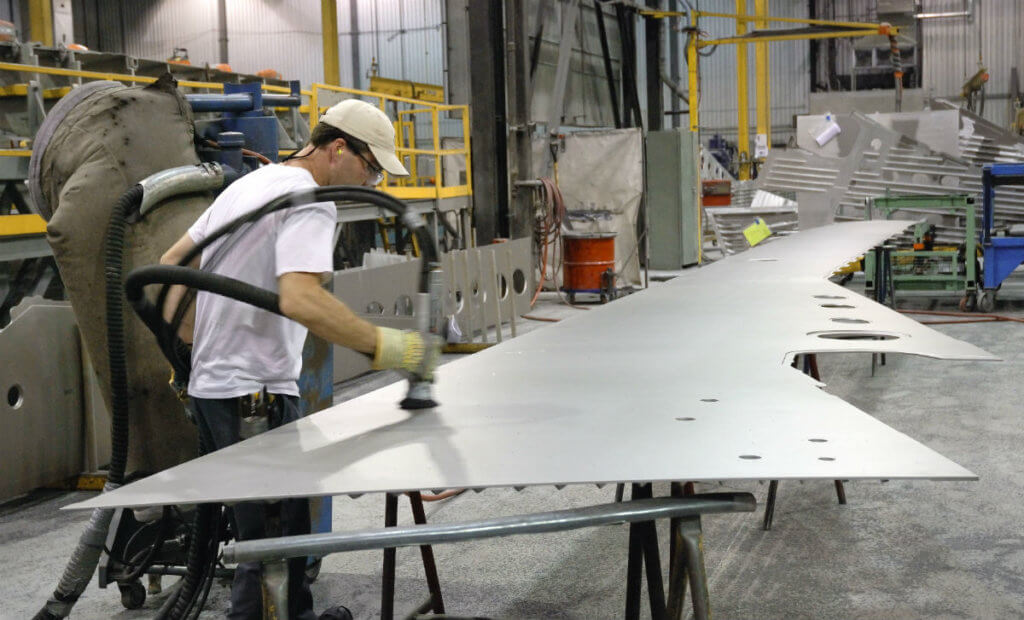Estimated reading time 10 minutes, 16 seconds.
Like most industrial sectors, aerospace is embarking on what many are calling Industry 4.0, the fourth wave of modern manufacturing characterized by greater automation and digitization as a result of big data, business analytics, ubiquitous connectivity, and enhanced human-machine interactions.

But for a sector comprised of mostly small- and medium-sized enterprises (SMEs), making the transition may require some help.
“Many of them are not ready for the 4.0 revolution,” said Suzanne Benoit, president of Aero Montreal, a think tank for the Montreal cluster of 200 aerospace companies, 180 of which are SMEs.
With less direct access to original equipment manufacturers (OEMs) such as airplane builder Bombardier or engine-maker Pratt & Whitney Canada, small businesses have to be efficient suppliers to the first- and second-tier companies with which the OEMs deal. And digitization plays a big part in that.
“They have to change their ways of working,” she said. “If they want to be…suppliers to the big Tier 1 and Tier 2 companies, they need to go with automation.”
Later this fall, Aero Montreal hopes to launch a program in conjunction with the Quebec Ministry of Economy, Science and Innovation that would help many of those companies bridge the digital divide.
Called MACH FAB 4.0, the program would provide funding and support to pre-qualified firms to develop projects that would introduce greater digitalization into their manufacturing processes. Benoit said approximately $19 million has been raised from public and private sources to support the program over a five-year period.
Details are still being fine-tuned with the government, Benoit said, but the program would likely begin with a call for proposals once it is launched and would target about 50 SMEs for the first cohort.
“This program will accelerate this digital shift for aerospace companies,” she said.

MACH FAB 4.0 builds off the successful MACH Initiative, a supplier development program launched in 2012 to help SMEs improve their strategic planning processes. The initiative brings together mentors from leading Montreal-area aerospace companies to work with smaller firms on everything from long-term planning, to talent development and corporate social responsibility.
Companies must have a sponsor before they can enter the program, and undergo an audit of 800 questions measuring 15 corporate process to receive an initial MACH rating of one through five (most companies begin around MACH 1 or 2). With that data in hand, companies and their sponsors initiate projects to improve their processes. Additional audits are conducted about every 15 months to assess their progress.
To date, 47 companies working with 28 mentors are at some stage of the MACH Initiative, which now involves 465 projects. Another 20 companies will be added in a fifth cohort before the end of 2016. Financing for the projects is provided from a $15 million fund and from the mentors, who give their time pro-bono.
The initiative gained Canadian-wide attention in 2012 with the release of the first volume of David Emerson’s government-mandated aerospace review, Beyond the Horizon. In 2015, the Conservative government pledged in the federal budget to reallocate $6 million from the Strategic Aerospace and Defence Initiative to develop a national model.
While that may have lost momentum with the change in government, Benoit said officials with the new Liberal government and Innovation, Science and Economic Development Canada have expressed interest in MACH 4.0. “We briefed them…and they liked it very much. So hopefully they will help,” she said.
All companies applying for MACH FAB 4.0 must have first completed the MACH Initiative audit, though they don’t necessarily have to be participants in the MACH Initiative. Benoit said questions measuring digital capacity would be added as a 16th process to the audit.
“I think the companies who are MACH 3 and up will be the best contenders to get into the new cohort of the digital program,” she said. “Our SMEs have improved their strategic planning, but now the next step is to improve in terms of manufacturing–the digitization of processes.”
Unlike the MACH Initiative, however, which required little financial outlay from the SMEs because their mentors’ pro-bono time was counted as the private sector contribution, MACH 4.0 would likely require companies to cover 50 per cent of project costs. But “that is still being worked out,” said Benoit.
Though the focus will be on digital processes, if a company wanted to explore additive manufacturing as part of its digital conversion, “we could do a study on that and…maybe they will get the assistance later,” said Benoit. “As long as there is some digital aspect to it, they will be eligible.”
Getting better
The value of the MACH Initiative to the Montreal sector has been immense. “I think we are a better company,” said Christian Sauve, vice-president and general manager of Alcoa Titanium & Engineered Products, a Laval-based machining and surface treatment assembly company that in December 2015 received the first MACH 5 rating. “Our overall management system is better. It has helped us focus our attention on some aspects of our business that maybe we were neglecting.”
Alcoa had been part of Bombardier’s five-star supplier program, but welcomed the chance to have the manufacturer as a mentor when the MACH Initiative launched in 2012. One of 20 companies in the first cohort, it received a MACH 3 rating after the first audit, a sign it was in good shape but lacked certain strategic planning processes and was missing market opportunities.
“It is a really broad program, covering all aspects of management of a company,” said Sauve. “It is more than just focusing on what you need to deliver on time and have good quality product.”
“We knew what we wanted to do, but in terms of having a formal process, well documented that you follow on a yearly basis and adjust based on what you see in the marketplace, that was one area that was identified right at the beginning.”

For example, he said, health and safety have been a priority but Alcoa had not paid as much attention to sustainability, “thinking about the environment, community, shareholders and all stakeholders that you have around a company.” A project was launched to develop sustainability objectives and how to achieve them.
Employee training, too, had been important, but under MACH the company produced a competency development program “that is better structured to identify the gaps across the country and where we want to put our money and focus,” he said.
Alcoa was also able to see firsthand Bombardier’s management processes and build a new relationship with the OEM. “We saw the factory floor, their daily management meeting in the morning with all the key performance objectives for the day,” said Sauve. “We also talked about collaborative engineering, bringing our manufacturing engineers to work more closely with them.”
After the first year, a second audit upgraded their rating to MACH 4. Reaching MACH 5, however, required some “considerable” steps, so the company developed a two-year plan to attain the highest ranking.
While the process may seem daunting for a small company with limited financial resources, Sauve said the most significant commitment was employee time. “You can go at the pace you want. Because we were already in a culture of continuous improvement, we just stretched ourselves, accelerated what we were doing.”
Alcoa, which received Aero Montreal’s 2016 Gilles-Demers Award for SME of the Year in Aerospace in September, was already developing international customers in the United States, Europe and Asia before it joined the MACH program, but the initiative has helped it solidify its customer base.
“They see you are well structured, well organized, you are giving them good service and good results, they can see you are a more mature organization,” Sauve explained. “We have to explain what MACH is but you can point to things you have done was a result of the program so that they understand it. We would like to see this program regularized by OEMs so that if you reach a certain level in the MACH program, you don’t have to demonstrate [the same] in their own program. It becomes a baseline.”
All of that will make Alcoa a prime candidate for MACH FAB 4.0, said Benoit.








